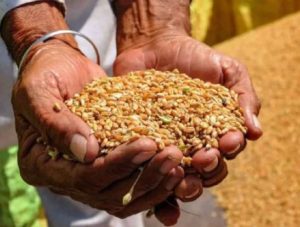
Turkey reportedly rejected the wheat shipment from India for alleged phytosanitary reasons. (Photo credit: PTI)
The mystery over the episode of a ship carrying a consignment of Indian wheat that seems to have landed up at an Israeli port after being rejected by Turkey and later by Egypt seems to be unravelling. Reportedly, the consignment of 55,000 tonnes of durum wheat was dispatched by ITC Limited to a party in Geneva for shipment to The Netherlands but somehow landed in Turkey after the Geneva firm sold it to a party in that country.
Turkey rejected the wheat on grounds of phytosanitary concerns, specifically after detecting rubella virus in the grain.
The ship carrying the wheat then headed for Egypt after the owner of the consignment sold it to Cairo. But there too the ship faced phytosanitary hurdles. Finally, the ship entered the Israeli where it is anchored till the fate of the consignment is decided.
ITC, the Indian company that sold the wheat to the Geneva firm, rejected the contention of the Turkey authorities about phytosanitary problems, stating that the consignment had passed all mandatory tests.
A firm with a reputation to protect, the last thing ITC would do is to overlook mandatory checks, but it now turns out that Turkey had other things in mind than the Indian origin wheat spreading rubella.
The cat was out of the bag with Russian television quoted Turkish Agriculture and Forestry Minister Vahit Kirisci as saying that Ukraine has agreed to sell grain to his country at a 25 per cent discount.
Although initially, Turkey had contracted a consignment of soft durum wheat from India, as opposed to hard white wheat, it seems to have developed second thoughts after the possibility of accessing Ukraine wheat through the port of Odesa.
Like India, Turkey is also a wheat-producing country, and much akin to India, it too grows mostly hard white bread wheat, used in making flat breads common across Asia, and both countries produce very little durum wheat, which is mainly used in making semolina in India, and pasta for European markets.
Turkey imports durum wheat for making pasta destined for export to the Italian market.
Global wheat prices have jumped to record levels, 56 per cent above the price around the same period last year, because of the Ukraine war.
The war has locked up 22 million tonnes of wheat in Ukraine, which together with Russia supplies about 30 per cent of the world’s wheat market.
With the loss of Mariupol in the East, Ukraine has lost its major port on the Azov Sea in the East, while Odesa on the Black Sea has been closed because of the threat of mines at the entrance to the port.
India’s decision last month to ban exports to ensure food security for its people further pushed up global prices.
In recent days, Ukraine has accused Moscow of stealing its grain that the Russian army had seized and then exporting it to Turkey.
Ambassador of Ukraine to Turkey, Vasyl Bodnar, who made the allegation as recently as last Friday, said his government had asked Ankara to “help resolve the issue,” meaning to not accept Ukrainian wheat from Russia.
Desperate for wheat, Turkey has been working with Russia and Ukraine to reach an agreement to reopen Odesa, Ukraine’s major Black Sea port, which is currently closed, to resume shipments of Ukrainian agricultural produce.
Russia is willing to play ball to get a few brownie points since it has been accused of driving the world to the edge of hunger by launching its invasion of Ukraine.
Russian Foreign Minister Sergey Lavrov is in Ankara to discuss with the Turkish authorities how to get the grain out of Odesa.
Turkey’s plan, if successful, will open a safe shipping corridor for the export of Ukraine grain that can ameliorate the worsening global food crisis.
The port has been closed because it has been mined heavily with anti-ship explosive devices that both Ukraine and Russia blame each other for.
Once opened, Turkey has said, its navy would escort ships carrying grain shipments out of the port.
It is this hope of Odessa being open for exports of wheat that seems to have persuaded Turkey authorities to reject the Indian origin wheat, not the Prophet controversy as many speculated, nor the rubella scare.
But Ankara may have to wait for long before it gets its durum wheat shipments from Odessa. Demining of the port may take months before it happens at all.
The Guardian quoted Ukraine’s first deputy minister of agrarian policy and food, Taras Vysotskyi, as saying that it would take six months to clear the coast of Russian and Ukrainian mines.




 Driving Naari Programme launched in Chandigarh
Driving Naari Programme launched in Chandigarh






























